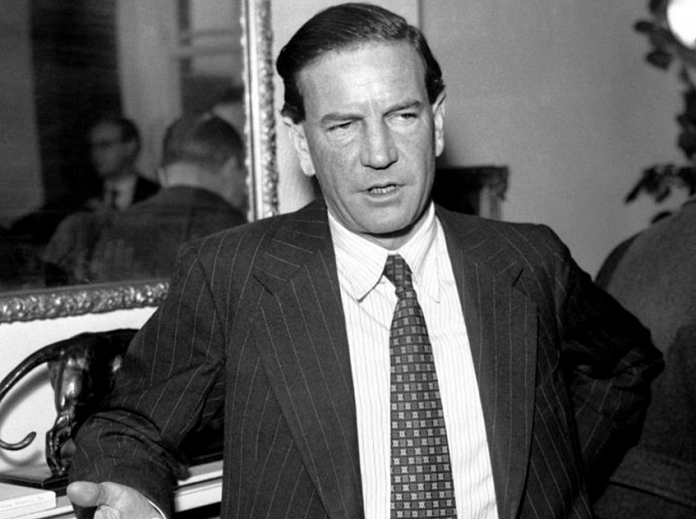The machinations of Kim Philby, the British spy on Russia’s payrolls, reportedly led to the death of several agents.
New Delhi: There was some amusement in the West in November last year, when Russia named a square in Moscow after Kim Philby, the notorious double agent of British origin who spent his life in service of the erstwhile Soviet Union.
The decision came amid the ongoing face-off between Russia and the UK over the poisoning of Sergei Skripal, a Russian who had spied for Britain and was labelled a “scumbag” by Russian President Vladimir Putin for betraying his nation.
The irony, The Telegraph noted, in Russia honouring a double agent months after allegedly attempting to kill one was not lost on anyone. However, it was yet another day in the annals of Russia’s frosty ties with the West.
Philby, the man Russia recognised with the naming of the square, remains one of the most intriguing double agents in the history of international espionage. He was a member of a ring of spies who infiltrated the British intelligence service MI6 in the 20th century and for years fed information to Moscow.
As luck would have it, Philby found himself handling a section that aimed to root out spies.
On his 106th birth anniversary, ThePrint remembers the British spy born in Ambala in pre-Partition India who remained a devout communist throughout his life.
Also read: Remembering Vikram Sarabhai, a man of science, lover of arts, student of space
An ardent cricketer at school
Harold Adrian Russell Philby, better known as Kim Philby, was born on 1 January 1912, in India to noted Arabist John Philby and Dora Philby.
Tim Milne, Philby’s closest associate in the MI6 and former classmate at Westminster, wrote in his book Kim Philby: The Unknown Story of the KGB’s Master Spy that the spy was a tough, self-reliant and self-confident boy at school.
He wrote, “He was never a popular figure, but neither was he unpopular. People accepted he was something of a loner. He had something untouchable about him, a kind of inner strength and self-reliance that made others respect him.”
When in school, Philby has been described as a spectacular cricketer.
Philby was a member of British society’s privileged higher echelons, a fact that he said helped him maintain his act. He completed his education from Trinity College at Cambridge University around the 1930s, and it is here that he is believed to have developed an affinity for communism.
After completing his education, he traveled to Vienna, where he married and soon divorced Litzi Friedmann, a member of the Austrian Communist Party.
Litzi turned out to be the first of four wives Philby, a serial philanderer, had over his 76 years.
In 1946, he got married a second time, to Aileen Furse, whom he allegedly treated so badly that she once told her psychiatrist that if she ever died under mysterious circumstances, it would probably be at Philby’s hands.
His third marriage with Eleanor Philby did not end on a pretty note either. While married to her, he is said to have cheated on her with the associate of a fellow double agent, Donald MacLean.
At the age of 58, he was attracted to Rufina Ivanovna Pukhova, a flame-haired copy editor 20 years his junior, and they got married in December 1971.
In an interview with the newspaper Moskovsky Komsomolets, she said that Philby used to drink a lot and spent his years in Russia, where he defected in 1963, “disillusioned and tortured by his own failings”.
His ‘silent war’
Philby is said to have been recruited as a Soviet agent in 1933, while in Austria.
In 1940, on the recommendation of another double agent, Guy Burgess, Philby was recruited to the MI6, where he became a member of the ‘Cambridge Spy Ring’ or ‘Cambridge Five’, a group that passed crucial information to the Soviet Union during and after World War 2.
The intelligence Philby shared with the Soviet Union is said to have led to the death of several British agents.
During World War 2, he worked with the US and the Soviet Union, allies for the war, on operations against the Hitler regime in Germany, a time that helped him garner a good reputation in British intelligence circles.
In 1951, he was posted in Washington, US. While there, his cover was nearly blown when he tipped off MacLean about an FBI investigation against him.
Philby asked his long-term acquaintance Burgess to go to England and inform Maclean as soon as possible, following which the latter two fled to Russia in 1951.
Philby came under the lens for tipping off Maclean and Burgess, but denied being a Soviet agent. He was subsequently given a clean chit, but dismissed from the intelligence agency in 1955.
From 1955 to 1963, he is said to have worked in Beirut under the guise of a reporter for The Times, before fleeing to Moscow amid strengthening suspicions about his role as a double agent.
Following this, he was employed as an occasional consultant to the KGB, the erstwhile state security agency of the Soviet Union.
Philby, in interviews given in Russia and his 1968 memoirs, My Silent War: The Soviet Master Spy’s Own Story, explained that he helped the USSR because he didn’t believe the western democracies were doing enough to fight Hitler.
He died on 11 May 1988, 25 years after defecting to the Soviet Union and three before the collapse of the USSR.



